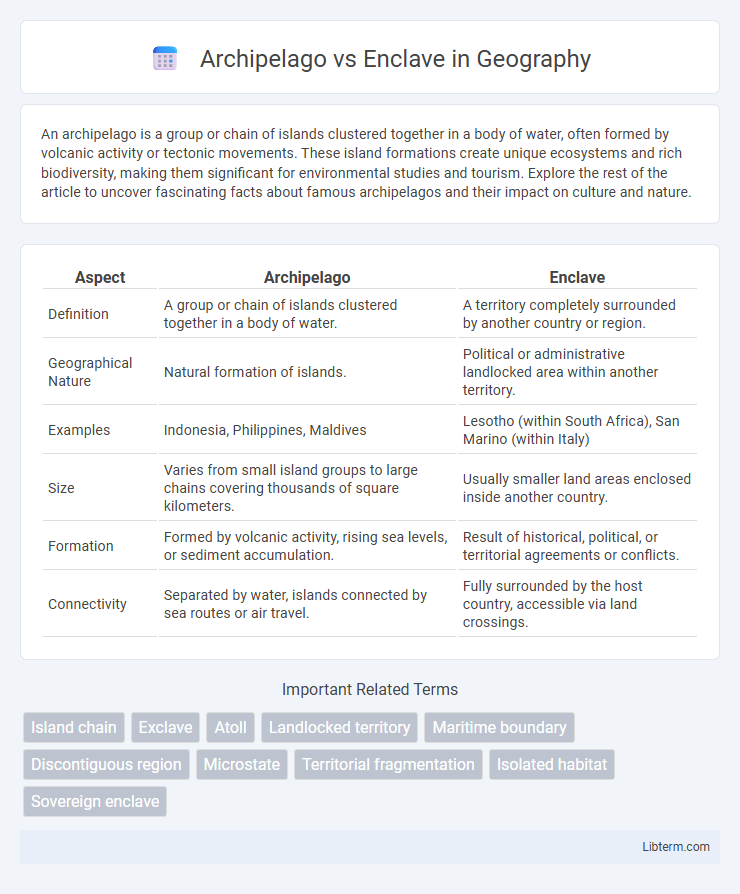An archipelago is a group or chain of islands clustered together in a body of water, often formed by volcanic activity or tectonic movements. These island formations create unique ecosystems and rich biodiversity, making them significant for environmental studies and tourism. Explore the rest of the article to uncover fascinating facts about famous archipelagos and their impact on culture and nature.
Table of Comparison
| Aspect | Archipelago | Enclave |
|---|---|---|
| Definition | A group or chain of islands clustered together in a body of water. | A territory completely surrounded by another country or region. |
| Geographical Nature | Natural formation of islands. | Political or administrative landlocked area within another territory. |
| Examples | Indonesia, Philippines, Maldives | Lesotho (within South Africa), San Marino (within Italy) |
| Size | Varies from small island groups to large chains covering thousands of square kilometers. | Usually smaller land areas enclosed inside another country. |
| Formation | Formed by volcanic activity, rising sea levels, or sediment accumulation. | Result of historical, political, or territorial agreements or conflicts. |
| Connectivity | Separated by water, islands connected by sea routes or air travel. | Fully surrounded by the host country, accessible via land crossings. |
Understanding Archipelagos and Enclaves
An archipelago is a group or chain of islands clustered closely together in a body of water, often formed by volcanic activity or tectonic movements. Enclaves are distinct territories or enclaves entirely surrounded by another state or region, typically existing due to historical, political, or ethnic reasons. Understanding these geographic concepts helps differentiate the spatial formation of archipelagos from the political and administrative nature of enclaves.
Key Geographic Differences
Archipelagos are groups of islands clustered together in a body of water, often formed by volcanic activity or tectonic processes, with examples including the Malay Archipelago and the Hawaiian Islands. Enclaves are territories entirely surrounded by another country's land, such as Lesotho within South Africa or San Marino within Italy, highlighting their political and geographic isolation. The key geographic difference lies in archipelagos being dispersed landmasses in water, whereas enclaves are landlocked areas enclosed by a different sovereign state.
Historical Formation of Archipelagos
Archipelagos typically form through volcanic activity, tectonic plate movements, or rising sea levels that flood coastal lands, creating clusters of islands with shared geological origins. Historical archipelagos such as Indonesia emerged from the Pacific Ring of Fire's intense volcanic activity, while others like the British Isles formed through glacial and postglacial sea level changes. Understanding these natural processes highlights the distinct geological and historical development patterns differentiating archipelagos from enclaves, which are politically defined territories within larger nations.
The Origins of Enclaves
Enclaves originated from historical territorial disputes where one state controlled a small territory entirely surrounded by another state, often resulting from treaties, wars, or colonial borders. These enclaves emerged due to complexities in political geography and the negotiation of borders, often reflecting ethnic, linguistic, or strategic considerations. Unlike archipelagos, which are naturally formed groups of islands, enclaves are politically defined land parcels isolated within another jurisdiction.
Socioeconomic Dynamics
An archipelago's socioeconomic dynamics often involve dispersed communities relying on maritime trade, fishing economies, and tourism, leading to diverse cultural exchanges and economic interdependence among islands. Enclaves, by contrast, face unique challenges due to their isolation within another political entity, which can limit access to resources, restrict economic integration, and create reliance on cross-border cooperation and informal economies. These spatial and political distinctions shape different patterns of economic development, social cohesion, and governance within archipelagic and enclave regions.
Political Implications and Governance
An archipelago, comprising multiple islands under a single political entity, often necessitates decentralized governance to address diverse regional needs and facilitate effective resource management. In contrast, an enclave, a territory entirely surrounded by another state, poses unique sovereignty challenges, frequently leading to complex diplomatic negotiations and security arrangements. Political implications for archipelagos typically involve balancing central authority with regional autonomy, while enclaves require careful governance strategies to navigate issues of jurisdiction, access, and identity.
Strategic Importance in Global Affairs
Archipelagos hold strategic importance in global affairs due to their control over vital sea lanes and maritime chokepoints, enabling dominance in naval operations and trade routes. Enclaves, often situated within foreign territories, present unique geopolitical challenges by affecting sovereignty, access to resources, and diplomatic relations between neighboring states. Both geographic entities influence military strategy, economic interests, and regional power dynamics, shaping international security policies and alliance formations.
Challenges in Infrastructure and Connectivity
Archipelagos face significant challenges in infrastructure and connectivity due to the dispersed nature of islands, requiring extensive investment in bridges, ferries, and undersea cables to maintain reliable transportation and communication networks. Enclaves confront distinct difficulties stemming from their geographic isolation within foreign territories, complicating access to essential services and creating logistical hurdles for infrastructure development. Ensuring seamless connectivity in both archipelagos and enclaves demands innovative solutions to overcome physical barriers and jurisdictional constraints.
Famous Archipelagos and Notable Enclaves
Famous archipelagos include the Indonesian Archipelago, the Philippine Archipelago, and the Hawaiian Islands, each comprising numerous islands with unique ecosystems and rich cultural histories. Notable enclaves such as Lesotho within South Africa, San Marino surrounded by Italy, and the Spanish exclaves Ceuta and Melilla on the North African coast represent distinctive political and geographical territories entirely enclosed by another country. These entities showcase diverse geopolitical characteristics, with archipelagos primarily defined by their island clusters and enclaves recognized for their complete territorial encirclement by foreign land.
Future Trends and Global Significance
Archipelagos, consisting of multiple islands, are increasingly significant in global maritime strategy and biodiversity conservation, influencing future trends in climate resilience and sustainable tourism. Enclaves, identified as politically or culturally distinct territories within a larger state, are pivotal in geopolitical negotiations and cross-border cooperation, shaping future frameworks for international law and conflict resolution. The evolving roles of archipelagos and enclaves highlight their strategic importance in global economic development and environmental sustainability initiatives.
Archipelago Infographic

 libterm.com
libterm.com